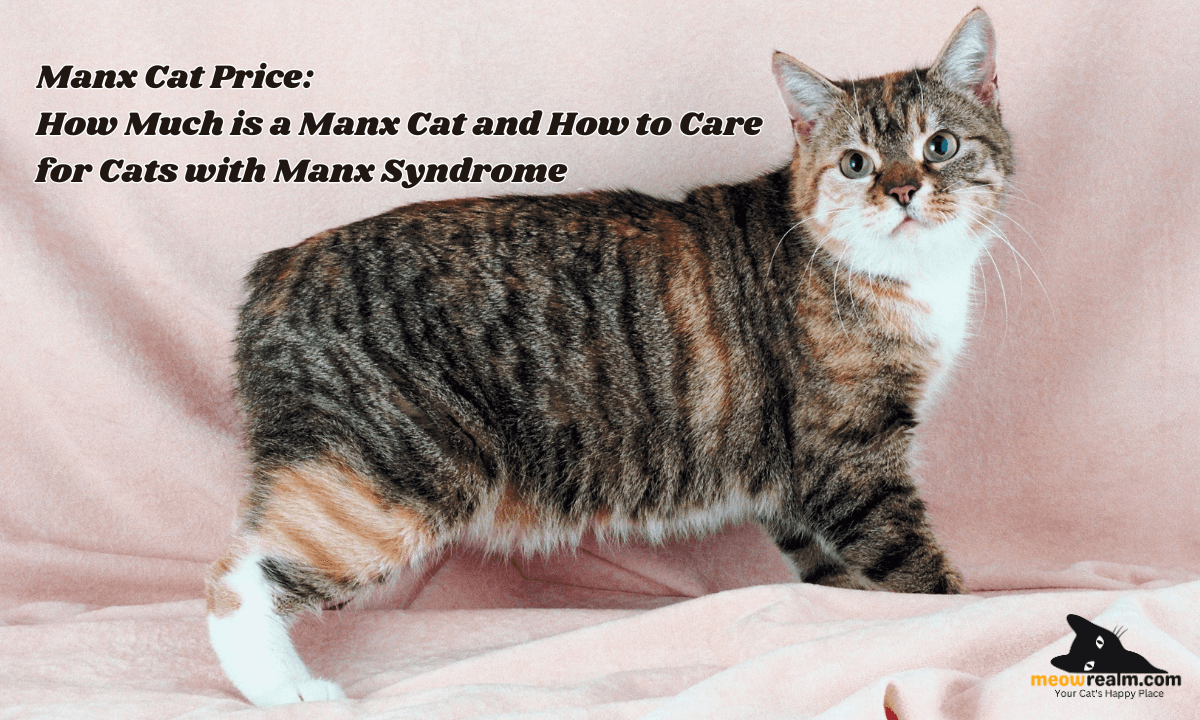If you’re considering adding a Manx cat to your family, one of the first questions you might ask is, “How much is a Manx cat?” Understanding the Manx cat price is crucial, but there’s more to consider than just the financial cost. The Manx cat, known for its unique tailless appearance and playful nature, can also suffer from a condition known as Manx syndrome. This guide will not only explore the factors that influence Manx cat prices but will also provide you with important information on how to care for a cat with Manx syndrome.
Manx Cat Price: What Influences the Cost?
- Breeder Reputation: Reputable breeders who adhere to strict breeding standards tend to charge more for their kittens. This is because they invest in the health and well-being of the cats, ensuring they are free from genetic disorders.
- Pedigree and Lineage: Manx cats with a strong pedigree or show-quality lineage will cost more. These cats are bred for specific traits, such as their distinct taillessness or a particular coat pattern.
- Coat Color and Pattern: Certain coat colors and patterns are rarer in Manx cats, which can drive up the price. For example, a Manx cat with a unique calico or tabby pattern might be more expensive than one with a more common coat.
- Location: The price of Manx cats can vary by location. In areas where Manx cats are more popular, you may find prices are higher due to demand.
- Age of the Cat: Kittens are usually more expensive than adult cats. However, adult cats may be more affordable and come with the added benefit of being already socialized.
How Much is a Manx Cat?
When determining how much a Manx cat will cost, you should also consider additional expenses beyond the initial purchase price. These costs can include:
- Veterinary Care: Regular vet check-ups, vaccinations, and potential treatment for conditions like Manx syndrome should be factored into your budget.
- Food and Supplies: High-quality cat food, litter, and other supplies like toys and scratching posts will add to the ongoing cost.
- Grooming: While Manx are relatively low-maintenance in terms of grooming, you may still want to budget for occasional professional grooming, especially if your Manx has a longer coat.
- Pet Insurance: Considering the potential for health issues like Manx syndrome, pet insurance is a wise investment. This can help cover unexpected medical expenses.
Taking all these factors into account, the lifetime cost of owning a Manx can range from $10,000 to $15,000, depending on the cat’s lifespan and any health issues that may arise.
Understanding Manx Syndrome
Manx syndrome is a condition that affects some Manx cats due to the genetic mutation responsible for their taillessness. This condition can cause a range of health issues, including:
- Spinal Defects: Some Manx cats are born with spinal problems that can lead to incontinence, difficulty walking, and other mobility issues.
- Bowel and Bladder Control Issues: Cats with Manx syndrome may struggle with bowel and bladder control due to nerve damage associated with spinal abnormalities.
- Digestive Problems: Manx with this syndrome may also experience digestive issues, such as constipation or diarrhea.
Not all Manx will develop Manx syndrome, but it’s important to be aware of the signs and symptoms if you’re considering adopting one.
How to Care for a Cat with Manx Syndrome
Caring for a cat with Manx syndrome requires extra attention and care. Here are some tips to help you manage this condition:
- Regular Vet Visits: Regular veterinary check-ups are essential to monitor your cat’s health and manage any symptoms of Manx syndrome. Your vet can provide guidance on how to best care for your cat.
- Specialized Diet: Depending on your cat’s digestive health, your vet may recommend a specialized diet to help manage bowel issues. This might include high-fiber foods or prescription diets.
- Litter Box Management: Cats with Manx syndrome may require a specially designed litter box that’s easier for them to access. You may also need to clean the litter box more frequently to accommodate any incontinence issues.
- Mobility Aids: If your cat has mobility issues, your vet may recommend mobility aids, such as ramps or special harnesses, to help your cat move around more comfortably.
- Medications: In some cases, your vet may prescribe medications to help manage pain, inflammation, or other symptoms associated with Manx syndrome.
- Quality of Life: It’s important to monitor your cat’s quality of life closely. Some cats with severe Manx syndrome may experience chronic pain or discomfort, and in such cases, it may be necessary to make difficult decisions regarding their care.
Understanding the Manx cat price and the cost of owning a Manx is just the first step in deciding whether this breed is right for you. Beyond the financial investment, caring for a Manx cat, particularly one with Manx syndrome, requires time, patience, and dedication. However, with proper care and attention, a Manx can be a loving and loyal companion, bringing joy and happiness to your home.

